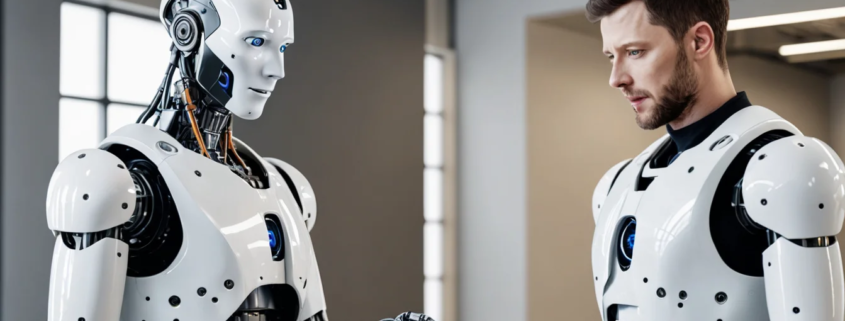Artificial Intelligence: What is AI and How It Works?
The term artificial intelligence (AI) is now omnipresent in the everyday language and also in the media. But what exactly is AI? And why should you care? Also, this article is your helpful companion that can unfold the knotty details of AI.
What is AI?
Consider an intelligent machine that learns, reasons and solves the problems – this is AI. It is not about the mimicry of human consciousness, but about machines being able to perform tasks that humans would usually need intelligence This may include data analysis, pattern identification, and future projection.
Why AI Matters?
AI does not only belong to fiction; it is already redefining our world. From redefining how healthcare is delivered via disease diagnosis and drug development to refashioning businesses with intelligent automation, AI’s impact has become undeniable. It can solve many global problems such as climate change to resource scarcity.
How Does AI Work?
Think of AI as a layer cake. The fundamental level constitutes powerful algorithms and complicated mathematical equations that govern the machine’s learning process. Now, there is the data, the driving force of algorithms. AI machines are trained with huge datasets through which they learn to derive patterns and make informed decisions. Finally, we have the computational power, the muscle of our intellectual endeavor. High-performance computers and also cloud infrastructure is what modern AI uses, to process large quantities of data quickly.
Applications of AI:
The possibilities of AI’s usage span a broad spectrum, far removed from science fiction. Let’s delve into some key areas where AI is making a real difference:
Healthcare:
AI is transforming the medical arena through enabling new technologies.
Accurate Diagnosis: One of the fundamental benefits that AI algorithms bring is their ability to analyze medical images and data, and accurately diagnose diseases early, leading physicians directly to treatment.
- Personalized Medicine: Such individualized treatment plans, which the AI creates by considering each patient’s genome and medical background, ensure better health outcomes at reduced costs.
- Drug Discovery: However, AI can help speed up the process of drug discovery by analyzing a huge number of chemical compounds and identifying those that have the most to offer as potential effective treatments.
Finance:
AI is revolutionizing the financial industry through:
- Fraud detection: These powerful AI algorithms can analyze financial transactions in real time to detect any fraud, hence protecting both the consumers and the businesses.
- Algorithmic trading: AI-based trading systems analyze the market data and trends to facilitate informed decisions on the investment, which frequently are a lot better than those of human traders.
- Personalized financial advise: AI can offer personalized financial advice to individuals depending on their goals and risk appetite, thus enabling them to make financially wise decisions.
Manufacturing:
First, AI is transforming the manufacturing sector by:
- Optimizing production processes: The data produced during the process can be easily analyzed using AI to find any inefficiencies and then streamline processes, which translates into a much more productive working environment with a lot less spending.
- Predictive maintenance: AI can forecast equipment failures before they take place, ultimately making it possible for preventative maintenance and to reduce downtime.
- Quality control: AI-driven vision systems enable the inspect products with great precision providing consistent quality and also minimizing defects.
These are only some of the many use cases showing how AI is being currently used in different fields. Given the development of AI technology, we will undoubtedly see further innovative and revolutionary applications.
Types of AI:
The AI world is not an indivisible whole. Types of artificial intelligence are very specialized in various fields and also undertakings. Here are two main categories:
- Narrow AI (Weak AI): A narrow AI, which is also referred to as applied AI due to its high performance in certain areas such as playing chess identifying faces, and translating languages. Most of the AI applications we see today belong to this group. They are specialized in carrying out specific tasks but they possess a limited general intelligence and adaptability as compared to human beings.
- General AI (Strong AI): This imagined kind of AI demonstrates human-level intelligence and also the capacity to learn and adapt beyond several domains. Although it is still science fiction, research continues in this area and some innovative developments may create real revolutionary solutions.
Where AI is Serving Humanity:
Much wider than that, the AI can benefit humanity. Let’s explore some promising areas:
Combating climate change:
AI can be used in many different ways.
- Optimizing production processes: The adoption of AI algorithms facilitates the improvement in solar and also wind energy systems that will greatly contribute to our transition into cleaner forms.
- Predict weather patterns: It can be used to prepare us for extreme weather occurrences as it will have the capability of making better forecasts by using large datasets that contain climate data.
- Develop sustainable solutions: AI also helps in the development of sustainable materials, products, and processes that aid us in fighting against climate change more efficiently.
Improving education:
- Developing adaptive learning systems: AI-driven online teaching facilities can change the level and rhythm of learning depending on each student’s performance, which allows the students to achieve high levels of proficiency.
- Providing individualized support: Students in need of more assistance can be easily spotted by the AI, who may assist them with targeted support and resources to ensure that no student is left behind.
- Creating engaging learning experiences: AI can tailor the learning materials and activities to the student’s interests and preferences, leading to a more enjoyable and efficient studying process.
Advancing scientific research:
- Analyzing massive datasets: AI can analyze a significant amount of scientific information to detect many patterns and trends that might have been overlooked by the people, within which discoveries may arise.
- Designing experiments: With the help of AI, the scientists can conduct experiments with relative ease and this also frees up more time for analyzing results.
- Developing new materials and drugs: AI can be used to simulate and predict the characteristics of new materials or drugs, which in turn speeds up innovative solutions.
These are only some of the many means AI has to create a much better world for everyone. However, the development and refinement of AI technology will only continue to become increasingly consequential in our daily lives.
The Future of AI:
Although AI brings in high opportunities, it is paramount to consider the ethical issues and also explore risks that might arise. Transparency, fairness, and responsible AI development are very essential in ensuring the human well-being is served by advancements in technology. We must be mindful of:
- Bias in AI algorithms: Biases that may have been present in the training data can be reproduced by some of the AI systems. To keep such discrimination and harm from happening, it’s very important to design AI algorithms that are equitable as well as unbiased.
- Job displacement due to automation: With automation by AI increasing, there is a great danger of job losses in some industries. It is time for us to prepare ourselves for this big transition and ensure that everyone gets their fair share of AI evolution.
- Privacy concerns: There is also a question of data privacy and the possibility of misuse of personal information by using AI. Strong laws and regulations on data protection should be introduced to ensure that individual privacy is well protected.
Acknowledging these limitations and embracing responsible development will make sure that AI contributes to a better future for everyone.
Remember, AI is not just a silver bullet, but an effective instrument. Through learning about its capability, handling all of the nuances, and guaranteeing ethical evolution we will have an AI that can be used to form a better world for our children’s future.





Leave a Reply
Want to join the discussion?Feel free to contribute!